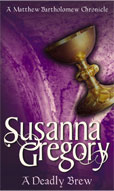 The Fourth Chronicle of Matthew Bartholomew
The Fourth Chronicle of Matthew Bartholomew
Pestilence, poison and priests can be a deadly brew …
The winter of 1353 brings new confusion to the people of Cambridge. Torrential rains spread fever to the poor, and make travelling hazardous along the town’s outlaw-infested roads. Then three members of the University die by drinking poisoned wine. Is this an attack by one College against another, or a new period of hostility between town and gown?
The flasks of poisoned wine are circulating through both knowing and innocent hands. Matthew Bartholomew would rather not get involved in the investigation, but when his own life is threatened, he realises he has become a target for people who have more than robbery on their minds. As he is drawn deeper in to his enquiries, he stumbles upon criminal activities that not only implicate his relatives, friends and colleagues, but also mix commercial greed and academic intrigue into a deadly brew of evil intent …
Amazon.co.ukKindle EditionWaterstones
Amazon.comUS Kindle Edition
Extract
October 1352
The afternoon had been growing gradually darker as storm clouds massed overhead. The scholar glanced up at them and realised he would not be able to reach the abbey at Ely, still some nine miles distant, without getting drenched. In his saddle bags, he carried several finely illustrated manuscripts that had been given to him by the grateful parents of successful students: if they became wet, the ink would run and they would be ruined.
He cursed softly. The summer and autumn had been unusually dry, so why did the heavens have to choose now, while he was forced to travel, to soak the parched earth with rain? With an irritable sigh, he urged his horse into a trot along the raised causeway that snaked through the desolate marshes. Since the storm would break long before he could hope to claim refuge with the monks at Ely, he resigned himself to the fact that he would have to take shelter at the Franciscan convent of Denny Abbey, the ramshackle rooftops of which he could already see poking above the scrubby Fenland vegetation.
From a dense tangle of bushes at the side of the road, three men watched his progress impatiently and heaved a sigh of relief when the sound of hooves finally faded away. They had no wish to be caught unsheltered in the storm that was brewing either. They clambered down the slippery bank of the causeway to the barge that was moored at the side of the canal, and seized the ropes by which it was drawn along. It was more usual for horses to tow barges, but there was always a risk that the beasts might give away the presence of the boat to travellers on the road. And that would be unfortunate for everyone concerned.
The three men hauled on the ropes and the barge was on the move, slipping soundlessly along the black, glassy waters of the channel that eventually meandered behind Denny Abbey’s walled gardens. They heard voices as the scholar was admitted into the nuns’ guesthouse, and then all was silent again except for the gurgle of water under the keel and the occasional sound of dead, dry reeds snapping under their feet as they walked. When the barge-men reached their destination, they coiled the tow ropes and began to unload their cargo – a number of roughly sewn sacks, the contents of which clanked together mysteriously as they were moved.
One of the men, younger than the others and curious, started to untie the cord that fastened the top of one particularly heavy sack. His friends, seeing what he was about to do, leapt forward to stop him.
‘Fool! We were told to deliver these without asking questions. They will kill us if they think we have been prying into their business!’
The young man scowled angrily. ‘If the cargo is so valuable, why did you charge them so little to bring it here? And why did you agree to deliver it at all if you are frightened of them?’
‘Because it was impossible to refuse,’ explained the other, lowering his voice, and glancing around him uneasily. ‘But when we have finished here, we will lay low for a while to make sure we are not hired for this again.’
The younger man treated his friends to a look of scorn for their timidity and returned to the heavy labour of removing the sacks from the barge to their hiding place. After a moment, the other two followed suit, straining and sweating under the weight of the irregularly shaped bundles.
Their voices, however, had carried across the otherwise silent Fens. Had they looked behind them, they would have seen the veiled head of a nun observing them from one of the upper windows of the convent. She stood unmoving, watching them struggle with their bundles until, with evident relief and a few final furtive glances around them, they finished and slipped away as silently as they had arrived. Within moments, the first drops of rain began to fall, lightly at first, but then harder until the lonely marshes were enveloped in a misty white pall as far as the eye could see. The nun tapped a forefinger on the window sill thoughtfully before going to pay her respects to the scholar waiting in the guesthouse.

